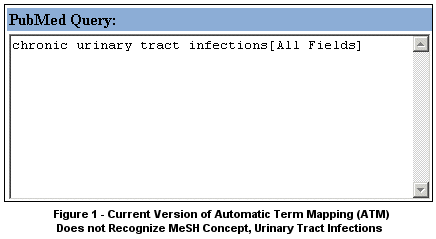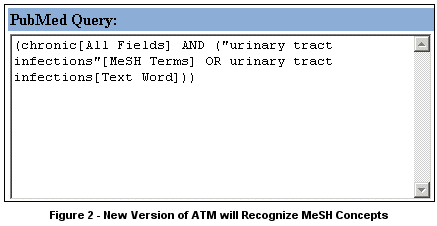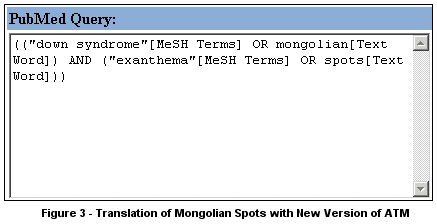 ubMed optimizes searches using a process known as
Automatic Term Mapping (ATM).
ATM compares terms from the search query with lists of terms:
MeSH (including UMLS mappings), journal titles,
author names, and phrases.
The list of phrases includes many with embedded MeSH terms, e.g., acute otitis media.
If a searcher's query includes a phrase found on the phrase list, it halts further comparisons
with other lists and searches the complete phrase "acute otitis media" rather than mapping to:
ubMed optimizes searches using a process known as
Automatic Term Mapping (ATM).
ATM compares terms from the search query with lists of terms:
MeSH (including UMLS mappings), journal titles,
author names, and phrases.
The list of phrases includes many with embedded MeSH terms, e.g., acute otitis media.
If a searcher's query includes a phrase found on the phrase list, it halts further comparisons
with other lists and searches the complete phrase "acute otitis media" rather than mapping to:
acute[All Fields] AND ("otitis media"[MeSH Terms] OR otitis media[Text Word])
To resolve this problem and improve searching, the phrase list will be removed from Automatic Term Mapping.
At that time ATM will work with:
- The MeSH Translation Table
- The Journals Translation Table
- The Author Index
[Editor's Note: This change to Automatic Term Mapping was implemented on April 10, 2003.]
Phrase Searching
PubMed will continue to search for phrases under these conditions:
- The phrase is entered with a search tag:
kidney allograft [tw]
- The phrase is enclosed in double quotes. (The absence of a search tag indicates the search should be conducted in All Fields.):
"kidney allograft"
- The term is hyphenated:
first-line
- The term is truncated:
kidney allograft*
These formats for phrase searching instruct PubMed to bypass ATM and look for the phrase in
PubMed's Index of searchable terms. If the phrase is in the Index, PubMed will retrieve
citations that contain the phrase.
The Index, which includes phrases from the former ATM phrase list, can be browsed on
PubMed's Preview/Index screen.
For more information about Phrase searching on PubMed, please see
Help.
(If you are unable to search a phrase in PubMed, please write to
custserv@nlm.nih.gov and let us know.)
Check Searches
If you have Cubby stored searches, you may want to see if they include terms that will be
affected by this change. To do this, log into the Cubby. On the list of your stored searches,
click on the name of a search. This takes you to the Stored Search Information screen for that
search. Click on the Search button to run your search (without updating it). On the screen
with the search results, click on Details. Look for multi-word terms in the PubMed Query box
that are tagged with [All Fields] (see Figure 1). Phrases with embedded MeSH terms are probably
best left alone as these will translate in accordance with ATM (see Figure 2).


If, after this change is implemented, you find that terms have mapped in an undesirable way (see Figure 3), you may want to consider
re-storing your search with the phrase in quotes (see Figure 4) to ensure a phrase search in All Fields.


After you have re-stored a search, use the Delete Selected Searches option in the Cubby to
remove the old strategy. For more information about using the Cubby,
see PubMed's Help
and also our article,
Revising PubMed® Cubby Stored Searches.
This change is expected to go into effect in early April. Watch PubMed's Home Page for an announcement or check
New/Noteworthy.
| To quote or not to quote?
It is important that searches be entered initially without
quotes around terms to benefit from Automatic Term Mapping. Use the Details feature to see
how the terms were mapped. If the mapping is not appropriate, or the retrieval was not as
specific as desired, quoting terms can then be considered. |
By Annette M. Nahin
MEDLARS Management Section

Nahin AM. Change to PubMed's Automatic Term Mapping Affects Phrase Searching. NLM Tech Bull. 2003 Mar-Apr;(331):e3.
| 






 ubMed optimizes searches using a process known as
ubMed optimizes searches using a process known as